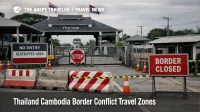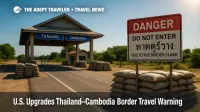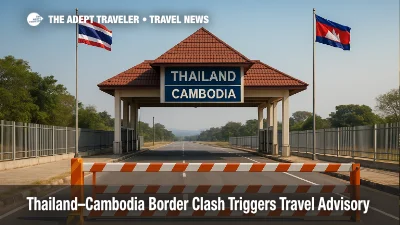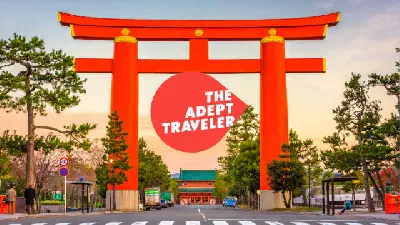Cambodia
Embark on an unforgettable journey and travel to Cambodia, a Southeast Asian gem that offers an enthralling blend of rich history, vibrant culture, and stunning natural beauty. From the awe-inspiring ancient temples of Angkor Wat to the bustling markets of Phnom Penh, Cambodia captivates travelers with its unique charm and diverse attractions. Whether you're wandering through the verdant rice paddies in the countryside, exploring the French colonial architecture, or relaxing on the pristine beaches of Sihanoukville, Cambodia’s varied landscapes cater to all types of adventurers. Savor the flavors of traditional Khmer cuisine, immerse yourself in the local traditions, and engage with the warm and hospitable Cambodian people who are eager to share their heritage. Travel to Cambodia to experience the pulse-pounding excitement of urban life mixed with the serenity of rural vistas. The country is not just about its historical marvels and incredible scenery; it's also a destination for those seeking meaningful encounters, whether that's by participating in community development projects or learning about Cambodia's resilient spirit and rich tapestry of history at various museums and cultural sites. Plan your travel to Cambodia and discover why this multifaceted destination continues to enchant those who are drawn to its unique allure.The History of CambodiaIf you are seeking an enriching and immersive experience, consider adding "Travel to Cambodia" to your bucket list. With an enthralling history that dates back to the early centuries of human civilization, Cambodia offers the discerning traveler a unique blend of ancient ruins, spiritually significant sites, and a deeply resilient contemporary culture. Whether you are a history enthusiast, a curious traveler, or someone simply looking to explore uncharted territories, Cambodia's historical allure is bound to captivate and inspire you.The Marvels of Angkor WatThe crown jewel of Cambodia's rich historical tapestry is undoubtedly Angkor Wat. Built in the early 12th century by King Suryavarman II, this grandiose temple complex served as the heart of the Khmer Empire, which was one of the most powerful empires in Southeast Asia. When you travel to Cambodia, a visit to Angkor Wat is indispensable. As the largest religious monument in the world, the site is a testament to the architectural prowess and spiritual devotion of its creators. The intricate bas-reliefs and towering spires, framed against the Cambodian sunrise, offer an unforgettable experience that transcends the mere act of sightseeing.The Resilience of Phnom PenhTravel to Cambodia also entails an immersion in the vibrant yet poignant history of its capital city, Phnom Penh. The city offers a vivid contrast to the ancient relics of Angkor Wat but is equally significant in understanding Cambodia’s historical journey. Phnom Penh stands as a living testament to the resilience of the Cambodian people, having rebounded remarkably from the tragic events of the Khmer Rouge era. When you travel through the city, you will encounter the haunting yet important Tuol Sleng Genocide Museum and the Killing Fields of Choeung Ek. These sites serve as powerful reminders of Cambodia’s recent past and are crucial for those looking to understand the indomitable spirit of its people.The Enigmatic Temples Beyond AngkorWhile Angkor Wat is the most famous, numerous other lesser-known but equally mesmerizing temples lie scattered throughout Cambodia. Sites like Ta Prohm, enveloped in the roots of ancient trees, and Banteay Srei, renowned for its delicate and intricate carvings, showcase different facets of Khmer architecture and artistry. When you travel to Cambodia, make sure to explore these enigmatic temples. Their relatively untouched conditions provide a sense of discovery and adventure, making your historical journey through Cambodia all the more rewarding.Living History in the CountrysideFor those who seek a holistic historical experience, rural Cambodia offers an unparalleled glimpse into lives that have changed little over the centuries. Travel to Cambodia’s countryside and you will find traditional stilted wooden houses, rice paddies stretching out to the horizon, and the enduring customs of a predominantly agrarian society. Villages like Battambang are replete with colonial architecture, and a ride on the bamboo train offers a whimsical journey back in time. The warmth and hospitality of the Cambodian villagers add an enriching layer to your historical exploration, making your travel to Cambodia a deeply personal and human experience.Embarking on a journey to Cambodia is not just about visiting ancient ruins or historical monuments—it is about stepping into a living, breathing narrative that continues to evolve. From the awe-inspiring temples to the resilient modern-day cities and the serene countryside, travel to Cambodia promises an unforgettable dive into a history that is as rich as it is profound. So pack your bags and set forth on a historical adventure that will leave you both enlightened and inspired.The Culture of CambodiaTravel to Cambodia to immerse yourself in a rich tapestry of culture, heritage, and warmth. Known for its ancient temples, vibrant traditions, and welcoming people, Cambodia is a destination that captivates the soul. Situated in Southeast Asia, Cambodia seamlessly blends its glorious past with a dynamic present, offering travelers an experience like no other. Whether you're exploring the ruins of Angkor Wat or wandering through bustling local markets, you will discover a land where history and modernity coexist in perfect harmony.The Soul of CambodiaThe heart of Cambodia lies in its people, known for their resilience, hospitality, and deep-rooted traditions. After enduring a turbulent history, Cambodians have emerged with an unbreakable spirit and a generous sense of community. When you travel to Cambodia, you will notice that the locals have a genuine willingness to share their culture and way of life. From the moment you arrive, you are greeted with warm smiles and open arms, making you feel right at home. The spirit of Cambodia can be felt in its small villages where traditional crafts are still practiced, as well as in its bustling cities where ancient customs influence modern living.A Festive and Culinary JourneyOne of the most compelling reasons to travel to Cambodia is the nation's vibrant cultural festivals and delectable cuisine. The Cambodian calendar is packed with a variety of festivals, each one offering a unique glimpse into the country's spiritual and social life. Pchum Ben, the festival of the ancestors, and Khmer New Year are particularly noteworthy, featuring colorful parades, traditional music, and dance performances. Additionally, Cambodian cuisine is a delightful revelation for food enthusiasts. Indulge in delicious dishes such as Amok, a creamy coconut fish curry, or Nom Banh Chok, a traditional rice noodle dish. Street food markets provide a sensory feast where you can savor an array of local flavors while mingling with friendly vendors and other travelers.Temples and TraditionsNo travel to Cambodia is complete without exploring its awe-inspiring temples and ancient sites. The crown jewel is undoubtedly Angkor Wat, a UNESCO World Heritage Site and the largest religious monument in the world. Witnessing the sunrise over Angkor Wat is a life-changing experience, but Cambodia has numerous other temple complexes and historical landmarks worth visiting. From the enigmatic faces of Bayon to the jungle-entwined ruins of Ta Prohm, each site tells a story of Cambodia's glorious past. Beyond the well-traveled paths, you will also find local pagodas where monks perform daily rituals, inviting you to experience the serene spiritual traditions that have been practiced for centuries.Responsible TravelCambodia is moving towards more sustainable and responsible tourism, making it an ideal destination for conscious travelers. Numerous initiatives promote eco-friendly practices and community-based tourism, allowing visitors to contribute positively to local economies while enjoying an authentic travel experience. Whether participating in homestays, supporting artisan crafts, or engaging in volunteer opportunities, your travel to Cambodia can have a meaningful impact. Through these efforts, you can connect with the heart of Cambodian culture in a way that is respectful and beneficial to both you and the local communities.Embark on a journey to Cambodia and discover a country that offers more than just beautiful landscapes and historical marvels. It's a place where every street, every smile, and every shared meal opens a window into a rich and enduring culture that welcomes all who visit. Whether you are an adventurer, a cultural enthusiast, or a mindful traveler, Cambodia promises an unforgettable experience that will stay with you long after your trip ends.The Food of CambodiaWhen you travel to Cambodia, you are embarking on a culinary journey that is as rich and intricate as its history. The flavors found across this Southeast Asian gem are a harmonious blend of fresh ingredients, time-honored techniques, and unique cultural influences. From the bustling streets of Phnom Penh to the serene landscapes of Siem Reap, the culinary scene in Cambodia offers a feast for both the eyes and the palate. Exploring Cambodia through its food provides not just a meal, but an experience that engages all the senses and leaves lasting memories.A Symphony of FlavorsOne of the most remarkable aspects of traveling to Cambodia is the diversity of its cuisine. Cambodian food, or Khmer cuisine as it is locally known, is characterized by the use of fresh herbs, aromatic spices, and an array of local produce. Signature dishes like Amok, a fragrant coconut milk curry steamed in banana leaves, offer an authentic taste of Cambodia’s culinary heritage. Street food stalls are ubiquitous, serving up everything from crispy spring rolls to Bai Sach Chrouk, a delicious breakfast dish of marinated pork over rice. Each bite tells a story of tradition and innovation, making travel to Cambodia an adventure for gourmet enthusiasts.Culinary Traditions and InnovationOne cannot talk about Cambodia without mentioning its historical and cultural influences on food. The culinary traditions in Cambodia are deeply rooted in the country's agrarian lifestyle and rich cultural tapestry. Freshwater fish from the Mekong River, aromatic rice from the paddies, and vibrant vegetables from local markets form the cornerstone of Cambodian recipes. However, modern chefs in Cambodia are now blending these time-honored ingredients with contemporary techniques, thereby reinventing and elevating classic dishes. This fusion ensures that when you travel to Cambodia, you experience both the past and the present in each meal.Gastronomic Adventures AwaitBeyond the extraordinary local food, travel to Cambodia also offers a variety of international cuisines influenced by French, Chinese, and Vietnamese culinary practices. Whether you're in a high-end restaurant in Phnom Penh or a cozy eatery in Battambang, the range of gastronomic experiences caters to all tastes. It’s not just about the food, though; the dining experiences in Cambodia are unique — ranging from floating restaurants on the Tonle Sap Lake to picturesque seaside shacks in Sihanoukville. Each venue adds its own charm, ensuring that your travel to Cambodia is peppered with unforgettable dining moments.Travel to Cambodia is more than just visiting ancient temples and scenic landscapes; it is about immersing yourself in a culinary culture as vibrant and diverse as its people. Each meal is a reflection of Cambodia's storied past and dynamic present, captivating travelers with unrivaled taste and authenticity. If you are seeking a destination where you can feast your way through a blend of tradition and innovation, then Cambodia deserves a spot on your travel itinerary. Let the flavors of Cambodia be the highlight of your next culinary adventure.What to See and Do in CambodiaTravel to Cambodia for an experience rich in history, culture, and natural beauty. Cambodia, a paradise in Southeast Asia, captivates travelers with its stunning landscapes, ancient temples, and vibrant local life. Here’s a detailed guide to ensure you make the most of your visit to this enchanting country.1. Explore Angkor WatLocated in Siem Reap, Cambodia, Angkor Wat is the largest religious monument in the world and a UNESCO World Heritage site. This iconic temple complex, built in the early 12th century, draws millions of travelers each year. Spend at least a day exploring the intricate carvings, majestic spires, and vast grounds of Angkor Wat. Sunrise visits are particularly popular, as the first light of day casts a magical glow over the ancient stones.2. Visit Phnom Penh’s Royal PalaceThe Royal Palace in Phnom Penh, Cambodia’s capital, is an architectural marvel that showcases the grandeur of Khmer architecture. The compound includes the Throne Hall, Silver Pagoda, and surrounding gardens, all meticulously maintained. The Silver Pagoda houses a revered Emerald Buddha, and the floor is inlaid with more than 5,000 silver tiles. A visit here offers a glimpse into Cambodia's regal history and spiritual traditions.3. Tour the Killing Fields and Tuol Sleng Genocide MuseumFor a sobering look at Cambodia's history, visit the Killing Fields of Choeung Ek and the Tuol Sleng Genocide Museum in Phnom Penh. These sites memorialize the tragedies of the Khmer Rouge regime. The Killing Fields offer a reflective space with marked mass graves, while Tuol Sleng, a former high school turned revolutionary prison, displays haunting photographs and personal accounts. These places are essential for understanding the resilience of the Cambodian people.4. Cruise the Tonle Sap LakeThe Tonle Sap Lake near Siem Reap is the largest freshwater lake in Southeast Asia and a vital part of Cambodian life. Taking a boat tour allows travelers to witness floating villages, where homes, schools, and markets float on the lake. This unique way of life is fascinating and provides insight into the adaptability and resourcefulness of local communities. Birdwatchers will also enjoy the Prek Toal Bird Sanctuary, home to rare and endangered waterfowl.5. Discover Battambang’s French Colonial ArchitectureBattambang, Cambodia, is known for its well-preserved French colonial architecture and artistic heritage. Stroll along the Sangker River to admire historic buildings and visit the city’s numerous galleries and cafés. The bamboo train (Norry) is a quirky and fun way to explore the countryside, providing scenic views of lush rice paddies and local villages. Phare Ponleu Selpak, a local circus school, offers captivating performances that shouldn't be missed.6. Relax on the Beaches of SihanoukvilleSihanoukville, Cambodia's premier beach destination, boasts pristine sandy shores and crystal-clear waters. Otres Beach is particularly favored for its laid-back atmosphere and fewer crowds. Enjoy water sports like snorkeling, diving, and sailing. The nearby islands of Koh Rong and Koh Rong Samloem offer even more secluded beaches and vibrant marine life, perfect for island hopping and adventure.7. Explore the Temples of Preah VihearThe Preah Vihear Temple, located on the Cambodian-Thai border, offers stunning views and fewer crowds than Angkor Wat. This ancient Hindu temple dedicated to Shiva sits atop a 525-meter cliff in the Dângrêk Mountains. The intricate carvings and unique setting provide a compelling reason to travel off the beaten path. The journey here also takes you through remote rural areas, allowing for a deeper connection with Cambodia’s landscape and culture.8. Trek in the Cardamom MountainsIf you're an outdoor enthusiast, travel to the Cardamom Mountains in southwestern Cambodia. This mountain range is one of Southeast Asia’s largest wilderness areas, teeming with biodiversity. Trek through dense forests, visit remote waterfalls, and witness wildlife such as elephants, gibbons, and clouded leopards. The eco-lodges and community-based tourism projects in the area promote sustainable travel and help preserve this pristine environment.9. Participate in a Cooking ClassCambodian cuisine, with its unique flavors and fresh ingredients, is something every traveler should experience. Join a cooking class in cities like Phnom Penh or Siem Reap to learn how to make traditional dishes such as amok (a fragrant coconut fish curry) and num banh chok (Khmer noodles). These classes usually include a visit to a local market, where you can discover exotic ingredients and gain insights into daily Cambodian life.10. Experience Kampot and Kep’s Culinary DelightsKampot and Kep, located in southern Cambodia, are renowned for their culinary offerings. Kampot is famous for its high-quality pepper, often regarded as the best in the world. Visit pepper plantations to understand the cultivation process and enjoy pepper-infused dishes at local restaurants. In Kep, don't miss the fresh seafood, especially the crab prepared with Kampot pepper. The Kep Crab Market offers a charming and authentic dining experience right by the sea.Travel to Cambodia promises a diverse array of experiences, from ancient temples and rich historical sites to breathtaking natural landscapes and delectable cuisine. Each destination offers its unique charm and insights into Cambodian culture, making it a must-visit for any traveler.Why You Should Travel to CambodiaTravelers from around the world find themselves enchanted by the allure of Cambodia, a Southeast Asian gem that offers a wealth of unique experiences. One of the key draws for those who travel to Cambodia is its rich historical tapestry, most prominently showcased by the legendary Angkor Wat complex. This UNESCO World Heritage site is the largest religious monument in the world and is a testament to the architectural ingenuity of the Khmer Empire. Visitors are often left in awe as they explore the intricate carvings and towering spires, with many choosing to witness the sunrise or sunset for a truly magical experience. But Cambodia's historical offerings extend beyond Angkor Wat to include the capital city of Phnom Penh, home to the Royal Palace and the harrowing yet essential Tuol Sleng Genocide Museum, which offers glimpses into the country’s more recent struggles.An equally compelling reason to travel to Cambodia is the opportunity to immerse oneself in the local culture, which remains beautifully unspoiled and authentic. Cities like Siem Reap and Phnom Penh, while modernized, still retain an old-world charm that captivates visitors. Whether it's sampling the famously delightful Khmer cuisine, participating in traditional festivals, or taking an artisan workshop, travelers have myriad ways to connect with the local way of life. Those who venture off the beaten path will discover quaint villages, floating markets, and warm-hearted locals whose hospitality makes every journey memorable. Additionally, Cambodia offers stunning natural landscapes such as the Cardamom Mountains, the serene beaches of Sihanoukville, and the diverse ecosystems of the Tonle Sap Lake.Moreover, Cambodia's affordability makes it highly attractive for those on a budget, ensuring that travelers can enjoy luxury experiences without breaking the bank. Accommodation options range from five-star resorts to budget-friendly hostels, all offering the chance to experience Cambodia's renowned hospitality. Local transportation, food, and activities are also incredibly economical, enabling visitors to explore extensively without financial strain. Trips can be customized to include everything from eco-tourism adventures to spa retreats, making Cambodia a versatile destination for all types of travelers.Why You Must Travel to CambodiaIf you are considering embarking on a new adventure, traveling to Cambodia should be at the top of your list. The breathtaking historical and cultural attractions alone are reason enough to plan your visit, but the added allure of untouched landscapes and genuine hospitality make Cambodia truly special. Plus, the affordability ensures that you can enjoy an enriching travel experience without the hefty price tag. Whether you are a history buff, a cultural enthusiast, or simply someone looking to unwind in a tranquil setting, Cambodia promises an unforgettable journey that will leave you longing for more.Tips & Tricks for Traveling in CambodiaTravel to Cambodia offers an experience steeped in history, vibrant culture, and breathtaking landscapes. Whether you're a first-time visitor or a seasoned traveler, there are always ways to enhance your journey to this captivating country. Here are some tips and tricks to make your travel to Cambodia smoother and more enjoyable.1. Get Your Visa in AdvanceOne of the first things to consider when planning your travel to Cambodia is obtaining a visa. Although visas can be acquired upon arrival at major entry points, it’s advisable to get your visa ahead of time to avoid long queues and potential issues. An e-Visa can be applied for online, granting you a smoother entry process once you land.2. Learn Basic Khmer PhrasesAlthough English is widely spoken in Cambodia's tourist areas, knowing a few basic Khmer phrases can go a long way. Simple greetings and polite expressions will endear you to locals and enrich your travel experience. Words like "Sua s'dei" (hello) and "Arkun" (thank you) can make your interactions more pleasant.3. Local Sim Cards for ConnectivityStaying connected is crucial, especially when you're navigating a new country. Pick up a local SIM card when you arrive. Companies like Smart and Cellcard offer affordable plans with data, which are indispensable for using maps, staying in touch with fellow travelers, and sharing your Cambodian adventures.4. Use Local TransportationOpt for local transportation to experience Cambodia more authentically. Tuk-tuks are a popular and affordable way to get around cities like Phnom Penh and Siem Reap. For longer distances, consider buses or even shared taxis (known locally as "remorks"). Not only do these modes of transportation offer a glimpse into daily Cambodian life, but they also help you travel economically.5. Respect Local Customs and EtiquetteUnderstanding and respecting local customs is essential when you travel to Cambodia. Always dress modestly, especially when visiting religious sites. Removing your shoes before entering temples and not touching people's heads are other important cultural norms to observe. Simple gestures of respect will earn you goodwill and provide a deeper cultural connection.6. Plan for the WeatherCambodia's climate can be quite unpredictable, with a monsoon season that brings heavy rainfall from May to October. Always check the weather forecast before planning your activities. Equip yourself with lightweight, breathable clothing, an umbrella, and waterproof bags to protect your belongings.7. Stay Hydrated and Eat SafelyCambodia’s tropical climate can be taxing, so staying hydrated is vital. Always drink bottled or purified water. When it comes to food, savor the local cuisine but be cautious where you eat. Opt for busy street food vendors where the turnover is high, and avoid raw or undercooked dishes to prevent foodborne illnesses.8. Choose Eco-Friendly OptionsSustainable travel is becoming increasingly important. Make eco-friendly choices by staying in green hotels, utilizing reusable water bottles, and reducing plastic use. Participating in community-based tourism projects can also help support local communities while giving you a richer travel experience.9. Secure Your BelongingsWhile Cambodia is generally safe for tourists, petty theft can occur, especially in crowded areas. Always be mindful of your belongings. Use a money belt or a secure bag, and avoid flashing expensive items. Keeping copies of important documents in a separate location can also be a lifesaver if you lose your originals.10. Connect with LocalsOne of the most rewarding aspects of traveling to Cambodia is connecting with its people. Engage in conversations, participate in local events, and visit community projects. This human element can provide unique insights and make your travel to Cambodia unforgettable. Remember, the stories and experiences shared with locals often become the highlights of your trip.Traveling to Cambodia is a unique adventure filled with memorable experiences. By following these tips and tricks, you'll be well-prepared to make the most of your journey, ensuring it is not only enjoyable but also enriching and safe.Other Places You Might LikeBangkok, Thailand - If you love the vibrant energy and rich cultural tapestry of Cambodia, you will find Bangkok, Thailand to be equally captivating. This bustling metropolis offers a fascinating blend of ancient temples, modern skyscrapers, and lively street markets. As you travel through its streets, you’ll encounter an array of traditional Thai experiences, from floating markets to the grandeur of the Grand Palace. By exploring Bangkok, you'll appreciate its shared Southeast Asian heritage with Cambodia, while enjoying the unique aspects of Thai culture.Luang Prabang, Laos - For those who cherish the serene Buddhist temples and tranquil landscapes of Cambodia, Luang Prabang in Laos is a must-visit destination. This UNESCO World Heritage Site is renowned for its well-preserved architecture, stunning natural scenery, and a deep sense of spirituality. As you travel to this enchanting town, you will find a peaceful atmosphere similar to Cambodia's Siem Reap, with its rich mix of French colonial and traditional Lao buildings, and picturesque waterfalls like Kuang Si.Hanoi, Vietnam - If the historical charisma of Cambodia captivates you, Hanoi, Vietnam will not disappoint. This city is a treasure trove of historical sites, old quarters, and street-side delicacies. As you travel to Hanoi, you can explore the Hanoi Old Quarter, the ancient citadel, and the peaceful Hoan Kiem Lake. Much like Cambodia's Phnom Penh, Hanoi is a city where the past seamlessly integrates with the vibrant present, offering a dynamic yet culturally rich atmosphere.Yangon, Myanmar - Yangon, Myanmar, with its gleaming pagodas and colonial architecture, will appeal to lovers of Cambodia’s historical treasures. As you travel through Yangon, the magnificent Shwedagon Pagoda is a sight to behold, much like the awe-inspiring Angkor Wat in Cambodia. Additionally, Yangon’s lively markets and the peaceful Inya Lake provide a mix of local culture and natural beauty, reminiscent of the diverse experiences Cambodia offers.Chiang Mai, Thailand - Chiang Mai, Thailand, with its lush mountainous terrain and myriad ancient temples, is a destination that will captivate any Cambodia enthusiast. Travel to Chiang Mai for an experience of traditional Lanna culture, fascinating night markets, and scenic trekking routes. Much like Cambodia's balance of vibrant cities and serene temples, Chiang Mai offers an ideal mix of cultural richness and natural beauty.Hoi An, Vietnam - The charming town of Hoi An in Vietnam offers a laid-back atmosphere and a blend of cultural influences that will resonate with those who love Cambodia. This ancient town, known for its preserved ancient houses and lantern-lit streets, offers an experience similar to the allure of Cambodia's smaller towns. As you travel through Hoi An, you can enjoy its colonial architecture, tailor shops, and the peaceful ambiance of the Thu Bon River.Bagan, Myanmar - Bagan, Myanmar, is a dream destination for those fascinated by Cambodia's temple complexes. This archaeological zone, filled with thousands of pagodas and temples, rivals the grandeur of Cambodia’s Angkor Archaeological Park. When you travel to Bagan, you will be immersed in a landscape rich with historical significance and breathtaking sunsets over the Irrawaddy River, offering an experience parallel to the magical dawns over Angkor Wat.Vientiane, Laos - Vientiane, the capital city of Laos, offers a relaxed pace of life and historical depth that will appeal to travelers who love Cambodia. Travel to Vientiane to explore its tranquil Buddhist temples, colonial-era architecture, and the iconic Pha That Luang stupa. Much like Phnom Penh, Vientiane provides a mix of cultural heritage and laid-back charm, giving travelers a well-rounded experience of Southeast Asian culture.Bali, Indonesia - For those who love Cambodia's unique blend of spirituality and aesthetic landscapes, Bali in Indonesia is a paradise not to be missed. Travel to Bali to experience its verdant rice terraces, vibrant arts scene, and numerous temples set against the backdrop of volcanic mountains and pristine beaches. Similar to Cambodia, Bali offers a harmonious mix of natural beauty, cultural richness, and spirituality that will captivate any traveler.
Angkor Ban, Cambodia

Angkor Thom, Cambodia

Angkor Wat, Cambodia

Banteay Meanchey, Cambodia

Koh Russey, Cambodia

Phnom Penh, Cambodia

Siem Reap, Cambodia

Sihanoukville, Cambodia

Tonle Sap Lake, Cambodia

Cambodia Thailand Border Clash Cuts Angkor Tour Demand

Thailand Cambodia Border Conflict Travel Zones

Thailand Cambodia Border Clashes: 50 km Avoid Zone

MSC Magnifica World Cruise 2028 Booking Details

Thailand Cambodia Border Curfews Close Crossings

Thailand Cambodia Border Clashes Tighten Travel Zones

Thailand Cambodia Border Fighting Triggers Travel Warning

Thailand Cambodia Border Clashes Disrupt Travel Plans

2028 World Cruise From Miami To Athens With Azamara

Phnom Penh Techo Airport Becomes Digital Hub 2025

Kalmaegi And Fung Wong Disrupt Flights In Southeast Asia

Global Guardian Flags Geopolitics as Top Travel Risk

Smithsonian Journeys Adds 42 River Cruises for 2027

Thai–Cambodian Border Level 4 Warning Seals Crossings

U.S. Upgrades Thailand-Cambodia Border Travel Warning

Thailand-Cambodia Border Clash Triggers Travel Advisory

Carnac, Ludwig Castles Join UNESCO World Heritage Sites

Heritage Line's July Sale Adds New Bai Tu Long Bay Itinerary

Thailand Travel Warning: Land Border Ban Disrupts Tourist Routes

Globus Launches New 2025 Independent Tours in Asia

Emerald Cruises Expands 2024-2025 Mekong Season

Unveiling Seabourn's Luxurious Global Expeditions for 2024-25

Regent Seven Seas Cruises Unveils New Grand Voyages for 2025 and 2026

Best Times to Travel to Asia: Avoid Summer Crowds and Costs

